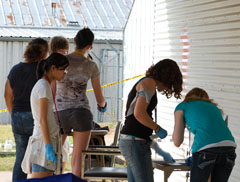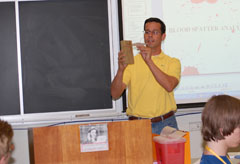
COLLEGE STATION —Students from Texas high schools got a lesson in forensics as members of the Forensic and Investigative Sciences program and Dr. Jeff Tomberlin’s FLIES lab participated in the annual Youth Adventure Program.
The event was held between July 24-30 at the Heep Center and at Tomberlin’s lab. The program is designed to encourage career exploration in the fields of interest to students in the 6th through 12th grades. Students that were attending the Forensics portion ranged from the 9th through the 12th grades.
Participants in the program are highly motivated to learn, think, and solve problems, and they typically have a strong interest in going to a college, university, and/or professional school. Each student selects one area of interest and studies only that area for the entire session, getting in-depth insights into the experiences of professionals in that particular field.

Dr. Jeff Tomberlin teaching YAP students on forensics
This is the fourth year that members of the lab have participated in the outreach event, which included interactive experiments and demonstrations with students on the various techniques used by many forensic scientists during investigations.
During the week, students watched as members of the lab demonstrated how to measure bloodspatter patterns, lift fingerprints from different media, and collect evidence at crime scenes. The students also had the chance to use what they had learned during a hands-on demonstration each day after the lecture.
The final day included four mock crime scenes that were set up outside Tomberlin’s lab building. During the morning, students were split into several small groups where they were challenged to solve a crime using the evidence that they see at each station.
“This is great,” one student participating during the mock crime scene said. “I have never got to see this done before and it’s cool seeing how it is done. This is definitely something I can use in the future.”
Professor Jeff Tomberlin said the program was a great way for the youths to learn about forensics and the Forensic and Investigative Sciences program at the university.
“The program is an excellent mechanism through which Texas A&M can recruit future students,” he said. “I also see it as an excellent opportunity for us to showcase the Forensic and Investigative Sciences program.”
“We all love the outreach aspect of the program,” said Ph.D. student Adrienne Brundage, who coordinated a previous event. “It’s great fun to be able to share knowledge and science with a group of young students, especially when those students are interested in what you’re trying to teach.”